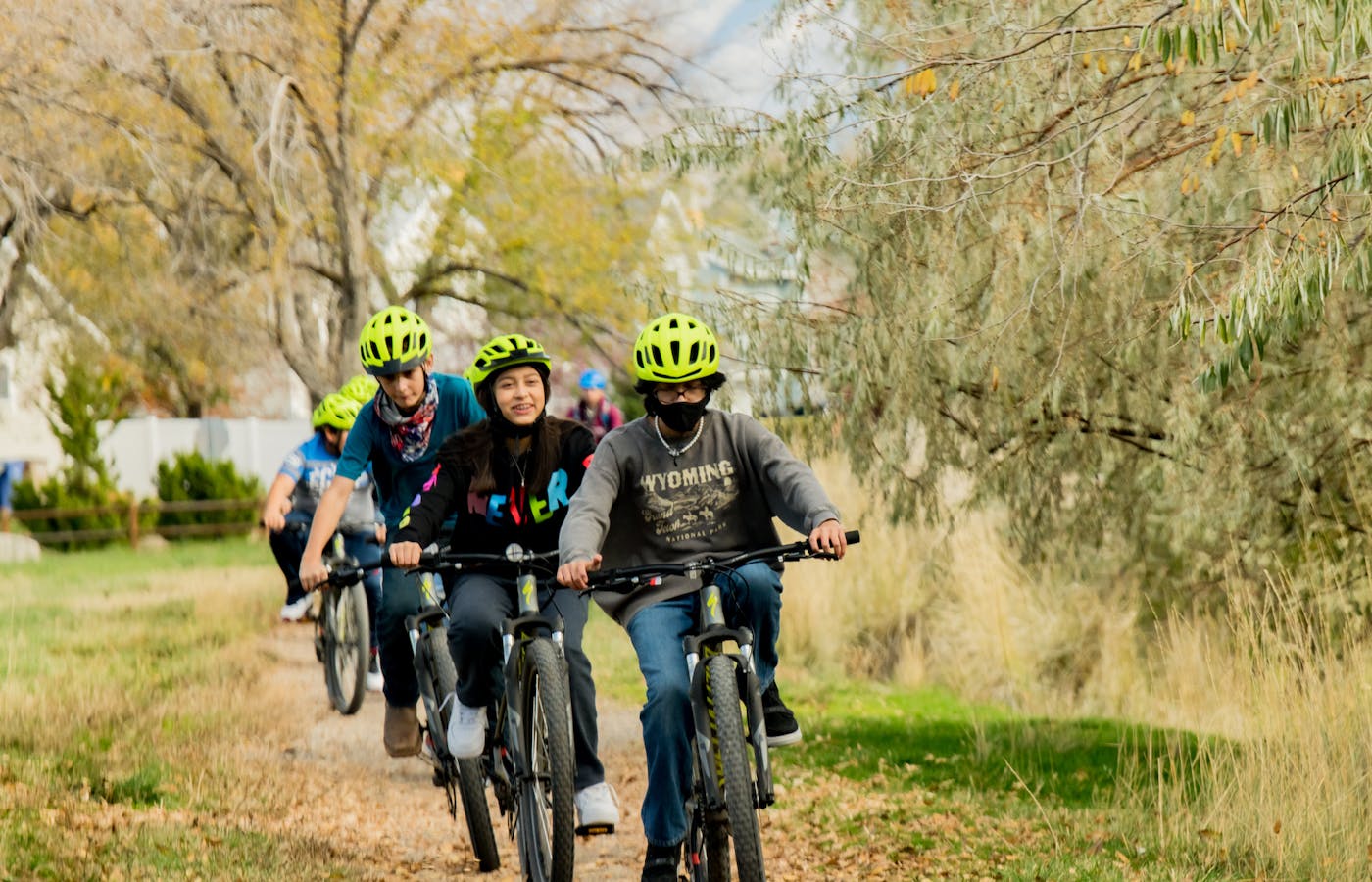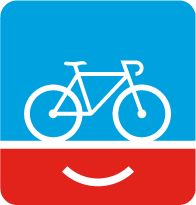Riding Bikes Is Good For Youth and Research Proves It
By: Nick Aguilera, PeopleForBikes’ youth and community partnerships manager

A new report from the nonprofit Outride showcases how bicycling can transform student’s health and well-being for the better. We spoke with Esther Walker, Ph.D about the new findings.
In the United States, we often take riding bicycles for granted, envisioning it as an American dream afforded to everyone. Unfortunately, for many youth, especially those from historically underserved communities, that’s not the case.
"Low-income and historically marginalized communities face a number of compounding issues from disparities in infrastructure, safety concerns and limited access to safe places to ride and be active. All of those things can contribute to higher rates of physical inactivity, screen time and poor physical and mental health," said Esther Walker, cognitive science Ph.D. and research program manager at Outride. "Increasing access to bikes, solid programming and safe opportunities to ride are really critical to make sure that these youth are not disproportionately left out."
Riding for Focus (R4F), Outride’s middle-school-based bicycling education program ensures youth from all backgrounds can tap into the joy and positive effects of bicycling. Quantitative and qualitative studies of R4F program participants showcases the mental, physical and emotional health benefits bicycling has on youth. Outride’s new report, “Riding for Fun, Friends, and Fitness: Advancing Youth Health and Well-being through Outride's Riding for Focus Program,” shares applied research findings from more than 900 students at 20 middle schools teaching R4F across the country.
We spoke with Walker to learn more about the positive impact of R4F, which provides schools with everything students need to ride, including bicycles, helmets, curriculum and intensive teacher training.

PeopleForBikes: Outride has been researching the impacts of bicycling on youth since 2012. What motivates your research?
Walker: Outride was founded on research and really based on the belief that bicycles can change lives. Our original research ultimately led to the creation of Riding for Focus, our middle school-based cycling education program, but we didn't stop there. As a learning organization, we really want to understand how bicycling can improve the lives of youth in their communities as well as the barriers that prevent youth from being able to ride bikes.
We then aim to put that research into action by providing grants that support school-based programs and community organizations that provide youth cycling programming.
How would you summarize your report for people short on time?
At the top level, what we see is that riding a bike and being physically active is good for your mental health, your physical health and your socio-emotional well-being. At the same time, we know that young people are more inactive than ever. Finding activities that they are motivated to participate in is really important. What we see is that riding a bike is one of those activities.
Youth overwhelmingly love riding their bikes — 85% of students say they have fun in our Riding for Focus programs. By providing youth with access to bikes, a safe environment to learn to ride and the confidence to ride independently, we can really help create healthy pathways.
Ultimately, youth need access to safe places to ride and programs that encourage riding outside of school. What we see is that 91% of students are interested in continuing riding, but there's a disconnect in terms of the students who have access to bikes and safe places to ride.
Students are facing record levels of physical inactivity and mental health challenges that have only been exacerbated by the pandemic. What does Outride's research reveal?
In our baseline surveys with our middle school Riding for Focus students across the country, we see that very few students are getting enough physical activity and enough sleep. Many students are spending very long hours in front of screens.
This is really alarming because these three behaviors — physical activity, lack of sleep and increased screen time — can have huge impacts on both physical and mental well-being over someone’s lifespan as well as their ability to focus and pay attention. On top of that, those negative trends are disproportionately affecting young girls, racially marginalized youth and youth from low-socioeconomic status backgrounds.
Physical activity is also strongly associated with mental well-being. Those who are able to be active also tend to report higher levels of well-being. Just getting out and being active one day a week is better than nothing. On top of that, we see that getting out for a bike ride is also associated with better mental well-being. As I mentioned in the previous question though, we know that not everyone has that ability to get out, ride and be active.
Why is having this data important?
Today’s youth are facing worrying levels of physical inactivity as well as mental health challenges. Finding those activities that get them excited to participate is really important. As we have seen throughout the COVID-19 pandemic, a lot of people turned to cycling, not only for transportation but also for the joy, freedom and the physical and mental health benefits that come with it.
We also know that there are large disparities in terms of access to bikes, bike repair shops and knowledge of how to ride. Understanding the state of youth access and experience with bicycling along with effective programs to get youth riding can help us identify those gaps and create and rally support to help close them.
What from your findings stands out and isn’t discussed enough?
It's really important to provide youth with the opportunity to learn how to ride. Many youth may never get that chance if it's not part of standard programming. Students have also highlighted that the ability to just get outside during the school day and ride with their friends is really important. There's been a lot of focus on what students are missing academically, but it's important to not let that come at the expense of physical activity and social interaction, both of which affect student well-being.
What does the research say about bicycling and its effect on mental well-being?
Students who report riding at least once a week also report higher levels of mental well-being than those who ride less often or not at all. We also know that getting outside in nature has been associated with positive mental health benefits, particularly for those facing high levels of stress.
On the qualitative side, when we ask students what they like about Riding for Focus, the same things often come up — it's fun to spend time outside with their friends. While this may seem obvious, having fun is a really important part of whether someone wants to continue engaging in an activity. If students are having fun, they'll want to participate more. If they participate more, then they can reap those mental, physical and other benefits that come along with it.
What differences has your research shown among low-income and historically marginalized communities?
Low-income and historically marginalized communities face a number of compounding issues from disparities in infrastructure, safety concerns and limited access to safe places to ride and be active. All of those things can contribute to higher rates of physical inactivity, screen time usage and poor physical and mental health.
Access to bikes at home is impacted both by socioeconomic status and race, which in turn impacts riding frequency. What we see is that our Black and Hispanic youth, along with youth in areas of high poverty, were less likely to have access to bikes at home than their peers. We also found that Hispanic youth had the lowest levels of bike riding confidence, yet after participating in the Riding for Focus program, they had high levels of interest in continuing to ride outside of school.
So again, there's a disconnect between what students report being interested in doing and what they actually have access to do outside of school. Increasing access to bikes and those safe opportunities to ride is really critical to make sure that these youth are not disproportionately left out.
What differences does your research show across genders?
Male and female students are both equally likely to have a bike at home. However, female students reported much lower levels of bike riding confidence at the start of the program than male students. They were also less likely to report riding regularly outside of school. After participating in Riding for Focus, there was high interest from both male and female students in continuing to ride outside of school.
Female students were less interested in getting involved in bike racing and more likely to report liking the social aspect of riding than male students. Ultimately, these differences are really important to consider when trying to increase physical activity levels among females, because they're already less physically active. They also have higher levels of screen time and typically report lower levels of mental well-being than their male peers.
How do you hope people will use your research?
This research highlights areas where we all can be doing more. It's clear that youth love riding bikes and want to engage in biking, but they often don't have the pathways to do so. I hope this report really helps people advocate for more access to bikes and safe places to ride, particularly for youth.
At Outride, we are continuing to work with community programs across the country to provide these pathways to riding outside of school, through our community matching grants and the Outride Fund.
Doctors in Canada can now prescribe National Park visits. Do you think we'll ever get to the point where doctors are prescribing bicycling for youth health?
More and more doctors are prescribing physical activity and time in nature to their patients. There's room for growth there. Bicycling is a great activity, but at the same time, that would also assume that everyone knows how to ride, really underscoring the importance of first providing all youth with the opportunity to learn how to ride a bike.

To date, Riding for Focus has been implemented in more than 225 schools across the country. Want to see a R4F program in your local school? Share Outride’s findings with your community and encourage them to apply today.

Related Topics:

